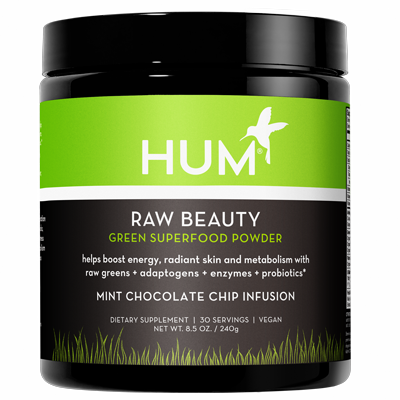Medically Reviewed By
Gaby Vaca-Flores, RDN, CLE
Registered Dietitian Nutritionist
This month we’re diving deep into the gut, starting with the gut-brain axis. Learn how much the bacteria in your gut can impact your brain, body, and health.
An estimated 34% of people face digestive health concerns such as diarrhea or constipation (source: HUM survey). By speaking with our consumers, we realized there are many questions, misinformation, and even embarrassment concerning gut health.
 However, there seems to be a real “poo taboo” in our society. We’re afraid to embrace our bowels and speak directly about digestive health. We’re puzzled about what it means to be regular and what to do about constipation or diarrhea. Should I actually be taking a probiotic? How do enzymes work, and why do commercials keep telling me I need more fiber? And what-the-gut is a leaky gut?
These important questions are at the very intersection of our health, wellness, beauty, and nutrition. Addressing them properly and having a deeper understanding of the gut can have a sincere impact on our futures. It can reinvent our relationship with food by transforming it from one of fear and guilt to appreciation and nourishment.
However, there seems to be a real “poo taboo” in our society. We’re afraid to embrace our bowels and speak directly about digestive health. We’re puzzled about what it means to be regular and what to do about constipation or diarrhea. Should I actually be taking a probiotic? How do enzymes work, and why do commercials keep telling me I need more fiber? And what-the-gut is a leaky gut?
These important questions are at the very intersection of our health, wellness, beauty, and nutrition. Addressing them properly and having a deeper understanding of the gut can have a sincere impact on our futures. It can reinvent our relationship with food by transforming it from one of fear and guilt to appreciation and nourishment.
 Potentially a ton! Research on the extent of this gut-brain axis and what it can mean for your health, mind, beauty, and body is growing. Studies can pave way for new insights on how we treat diseases, plus preventative measures we can take going forward. To see more about the role microbes play in the body, read about three ways your gut impacts you.
Potentially a ton! Research on the extent of this gut-brain axis and what it can mean for your health, mind, beauty, and body is growing. Studies can pave way for new insights on how we treat diseases, plus preventative measures we can take going forward. To see more about the role microbes play in the body, read about three ways your gut impacts you.
 However, there seems to be a real “poo taboo” in our society. We’re afraid to embrace our bowels and speak directly about digestive health. We’re puzzled about what it means to be regular and what to do about constipation or diarrhea. Should I actually be taking a probiotic? How do enzymes work, and why do commercials keep telling me I need more fiber? And what-the-gut is a leaky gut?
These important questions are at the very intersection of our health, wellness, beauty, and nutrition. Addressing them properly and having a deeper understanding of the gut can have a sincere impact on our futures. It can reinvent our relationship with food by transforming it from one of fear and guilt to appreciation and nourishment.
However, there seems to be a real “poo taboo” in our society. We’re afraid to embrace our bowels and speak directly about digestive health. We’re puzzled about what it means to be regular and what to do about constipation or diarrhea. Should I actually be taking a probiotic? How do enzymes work, and why do commercials keep telling me I need more fiber? And what-the-gut is a leaky gut?
These important questions are at the very intersection of our health, wellness, beauty, and nutrition. Addressing them properly and having a deeper understanding of the gut can have a sincere impact on our futures. It can reinvent our relationship with food by transforming it from one of fear and guilt to appreciation and nourishment.
The Gut-Brain Axis
It’s important to consider just how profound an effect your gut can have on your health, body, and mind. The gut-brain axis describes this dual relationship and ongoing communication between the activity in both the gut and the brain. An article in the Annals of Gastroenterology describes it as “bidirectional communication… linking emotional and cognitive centers of the brain with peripheral intestinal functions.” The bacteria in your gastrointestinal tract signals the brain, and vice versa, through various links (neural, endocrine, immune, and humoral). It’s increasingly evident that these communications can impact behavioral and cognitive functions like learning, memory, and decision making.So what does this mean?
 Potentially a ton! Research on the extent of this gut-brain axis and what it can mean for your health, mind, beauty, and body is growing. Studies can pave way for new insights on how we treat diseases, plus preventative measures we can take going forward. To see more about the role microbes play in the body, read about three ways your gut impacts you.
Potentially a ton! Research on the extent of this gut-brain axis and what it can mean for your health, mind, beauty, and body is growing. Studies can pave way for new insights on how we treat diseases, plus preventative measures we can take going forward. To see more about the role microbes play in the body, read about three ways your gut impacts you.
Microbes and the brain
The gut-brain axis is a complex, ongoing set of neurochemical interactions between the gut and brain. Current research tackles microbiota’s role on mood and anxiety, bone mass and joint pain, and inflammation and skin concerns. Regarding mood change and depression, nearly 70% of people with the gastrointestinal disorder IBS also have depression. Additionally, celiac disease correlates highly with major depression. Further research is needed to see which is the cause versus effect of gut flora and the illness. However, it has real potential to change how we treat and understand diseases.Impact of probiotics
Studies have been promising when looking at how high-quality probiotics are introduced into the gut to restore normal intestinal flora. One study found that when supplemental probiotics were included into a group’s diet for one month, mood improved and levels of stress hormones were reduced. Another study at UCLA found a group of healthy women who consumed yogurt—a probiotic with the strains bifidobacterium, streptococcus, lactococcus, and lactobacillus—showed a significant difference in reacting more calmly to images of facial expressions than a control group. Importantly, this study indicated that bacteria changed the makeup of the gut’s microbiota, which in turn modified brain function.Book Review: GUT: The Inside Story of Our Body’s Most Underrated Organ
Among our first in-depth looks at breaking the “poo taboo” was reading Gut: The Inside Story of Our Body’s Most Underrated Organ. Author Giulia Enders is a German microbiologist, writer, and expert on gut health. After a 10-minute lecture at a science slam in Berlin went viral, Enders became one of the world’s most popular gut experts. The book includes engaging chapters like “How Does Pooping Work? And Why That’s an Important Question.” Enders speaks frankly about digestive science and the gut’s impact on the brain and body in an engaging, charming manner. Therefore, if you’d like to learn more about the microbiome and the gut-brain axis, Gut is a great place to start! If you have any questions about the gut, please email us at healthy@humnutrition.com or tweet us @humnutrition.More like this









